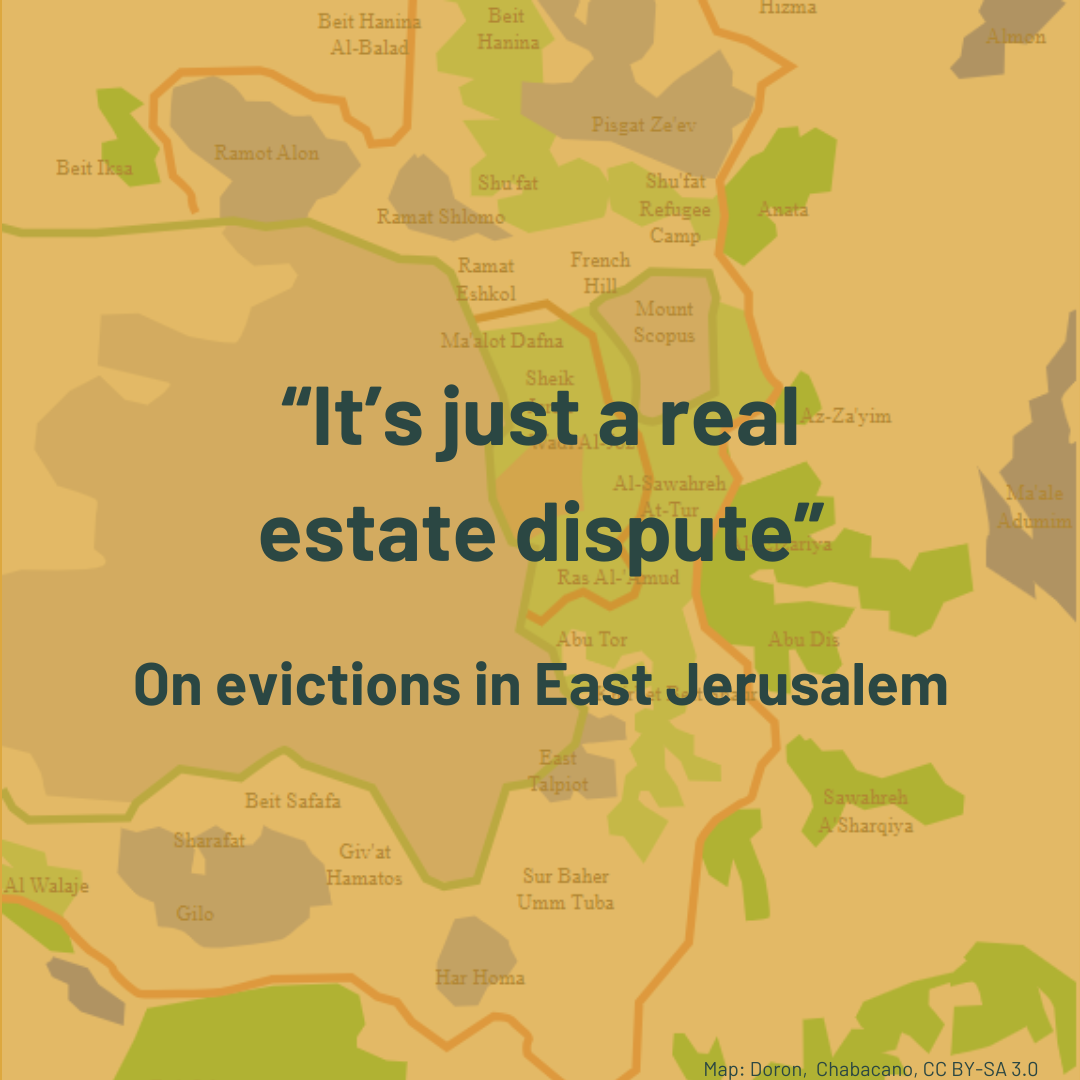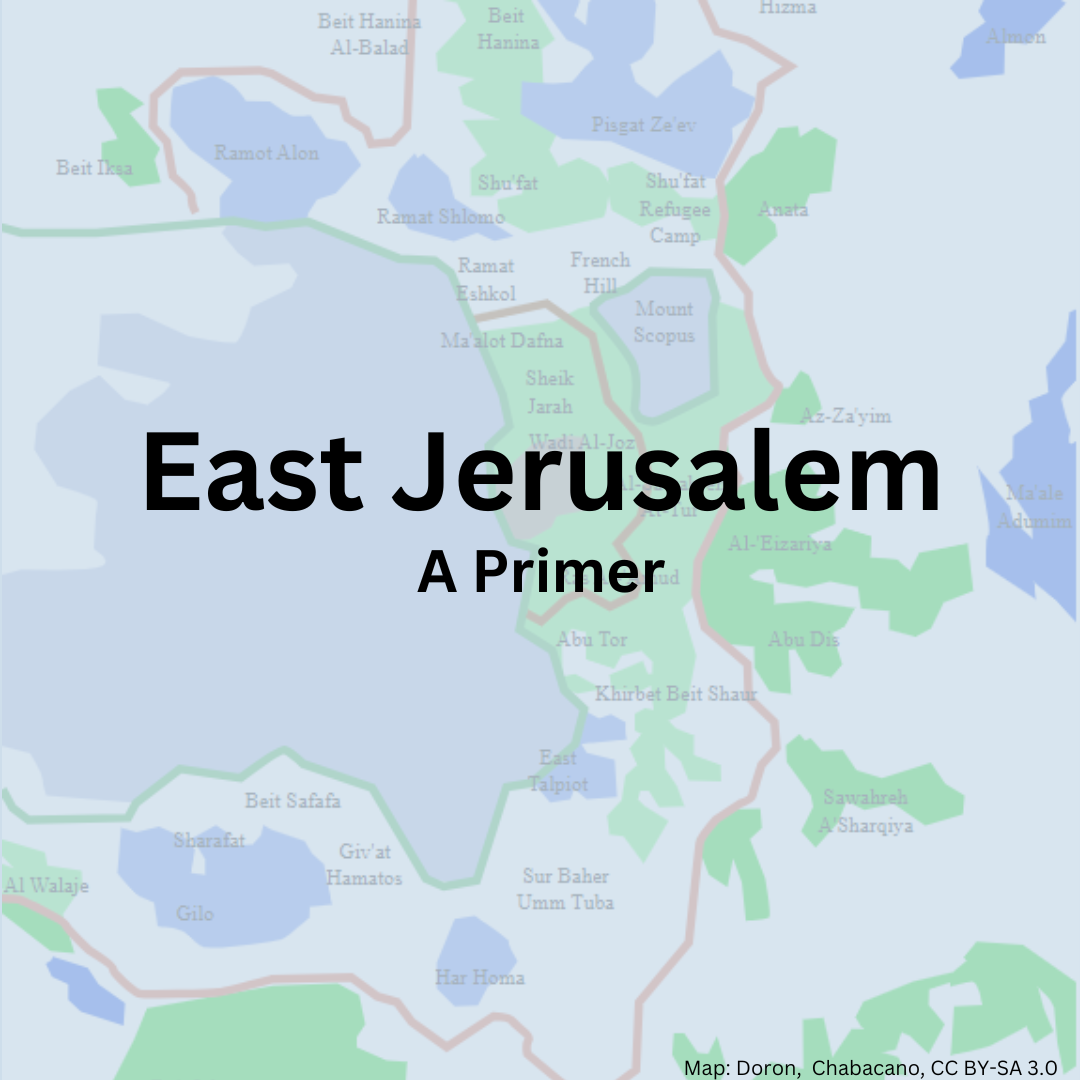Across East Jerusalem—which Israel occupied and annexed in 1967—hundreds of Palestinian families are at risk of being evicted from their homes.
Often, these evictions are presented by the authorities, and understood by people, as ‘real-estate disputes’ between two parties trying to define the property’s rightful owner.
But, over time, they have resulted in around 150 Palestinian families losing their homes and are slowly changing the character of some East Jerusalem neighborhoods.
What’s going on?
Property lost during war and compensation
In the war of 1948, both Palestinians and Jews were displaced from parts of Jerusalem, leaving property or land behind them. West Jerusalem came under the control of Israel while East Jerusalem (including the Old City) came under Jordanian control.
On both sides, the ruling government nationalized property left behind and managed it.
In most cases, Israel compensated Jewish residents forced to flee East Jerusalem.
Under Jordanian rule, some of the previously Jewish-owned property (buildings or land) in East Jerusalem was used to house Palestinian refugees. While these families received the properties under the appropriate Jordanian procedures between 1948 and 1967, they are now among those facing eviction claims.
The law and the discrimination within it
Following the occupation and annexation of East Jerusalem, Israel passed a 1970 law allowing Jewish individuals to reclaim properties they owned in the area before 1948, regardless of the Palestinian residents. The General Custodian, part of the Ministry of Justice, manages these properties until reclaimed.
While the law enables reclamation of previous privately-owned Jewish property, the 1950 Absentee Property Law prevents Palestinians from retrieving homes they were forced to abandon in 1948 in West Jerusalem or in other parts of what became Israel.
The 1970 law was enacted despite the fact that most Jews who lost homes in East Jerusalem had already received state compensation, sometimes by receiving property in West Jerusalem that had formerly belonged to Palestinians.
Who claims these properties?
Over the years, the 1970 law has nearly exclusively been used or exploited by organizations with a political agenda and no connection to the former owners.
Today, many of the evictions that take place in East Jerusalem, in neighborhoods like Silwan or Sheikh Jarrah—which garnered international attention in 2021—occur via this law.
While each case is slightly different, they all share a general structure: A settler organization acts to acquire the rights to these properties and then initiates an eviction lawsuit against the current residents. The process goes through the Israeli courts and often ends in confirmation of the eviction. Then, once the eviction takes place (a process aided by the police), the property is used for Jewish settlement.
State backed, settler takeovers of Palestinians homes
Despite claiming non-involvement in ‘private property disputes’, the state actively assists right-wing organizations in seizing property.
The Shehadeh family was recently evicted from Silwan, and the neighboring Gheith family faces imminent eviction after Supreme Court Justice Sohlberg, himself a settler, rejected their appeal without awaiting the Attorney General’s opinion. Dozens more families face similar legal proceedings.
In another case, Mohammed Kastiro faces eviction from his decades-old coffee shop near Damascus Gate, following a lawsuit by the General Custodian—effectively, the state itself. Previously, such cases resulted in Palestinian evictions and property transfers to settler groups without proper tenders.
Silwan as an example
In Silwan, the ‘Benvenisti Trust’ built houses for Yemenite Jewish families in the 19th century, who left during the violence of 1929. Today, ‘Ateret Cohanim’, a settler organization, is taking over these properties through the Trust, whose control was handed over to the organization in 2001, with the state’s approval.
Palestinian families, many displaced in 1948, have lived on these properties for generations. Now, Ateret Cohanim aims to evict them and settle new residents.
Peace Now reports that 15 families have already been evicted, there are proceedings against 80 more, and court-ordered evictions for 100 residents now under appeal.
Despite not adhering to the Trust’s original purposes, Ateret Cohanim’s control was approved by Israeli courts and the state, and supported by the General Custodian.
Why Silwan and Sheikh Jarrah?
The Old City Basin, which includes the Old City and surrounding Palestinian neighborhoods, is Jerusalem’s most contested area due to its concentration of holy sites.
Today, Palestinians outnumber Israelis in the Old City Basin by about 100,000 to 6,000, but, for decades, settler groups, backed by the state, have been working to create a ring of Israeli control in this area in order to ensure that Israel will not give up the Old City Basin in any future political agreement.
Evictions are one part of this larger strategy, along with the establishment of national parks and settler-operated touristic sites.
Sheikh Jarrah (north of the Old City) and Silwan (south of the Old City) face the most pressure due to their strategic locations. In these two neighborhoods alone, about 170 families (over 1000 individuals) are at risk of displacement from settler-initiated eviction claims.
The Bottom Line
Evictions in East Jerusalem, often framed as real estate disputes, are part of a broader strategy to increase Israeli control over the Old City Basin. Palestinian families, who obtained homes legitimately, are being displaced due to a biased law that allows Jews, but not Palestinians, to reclaim pre-1948 property.
While these cases are fought individually in court, they reflect a larger political issue. Settler organizations, not original owners, are exploiting this law to maintain exclusive Israeli control over Jerusalem.
Both Jewish and Palestinian connection to the city is undeniable and unbreakable. Evicting Palestinian families is neither a legitimate nor moral way to decide the city’s future.
Urgent action is needed to stop these evictions.
Sources
For free sources and follow up: https://buymeacoffee.com/beccaexplains/on-evictions-east-jerusalem

